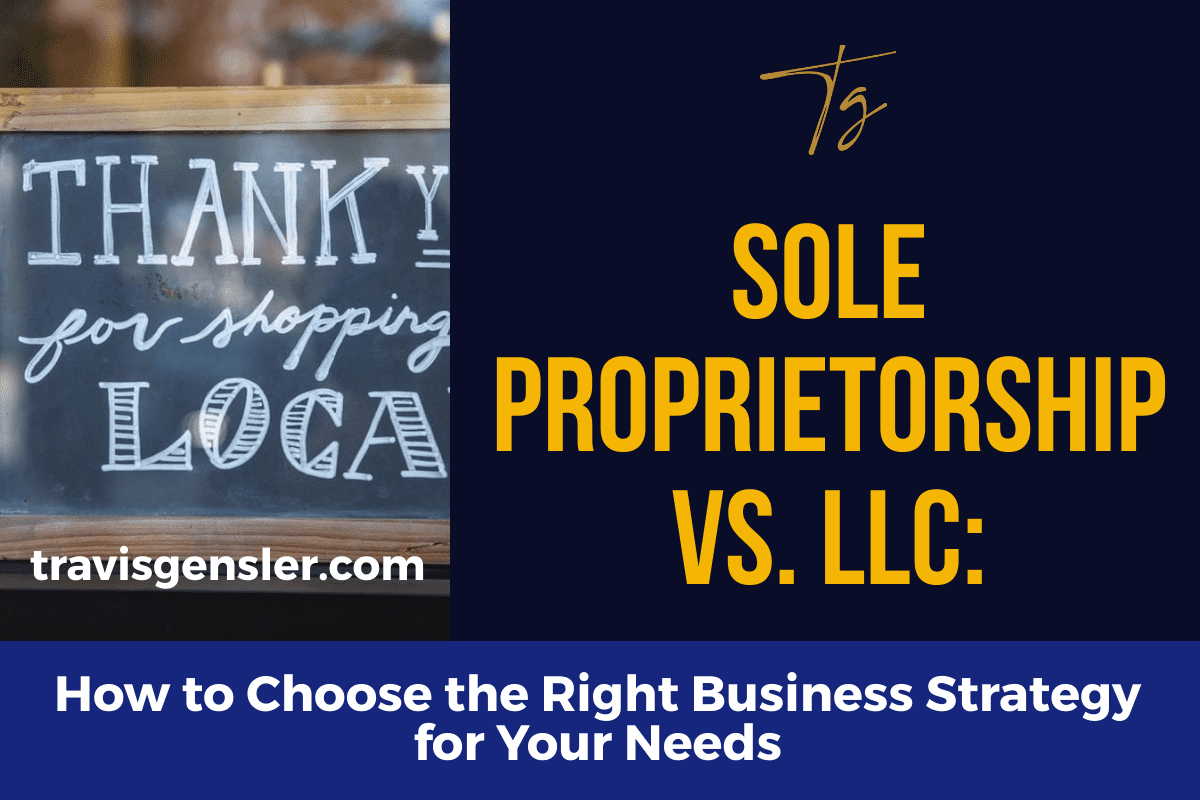Sole Proprietorship vs. LLC: How to Choose the Right Business Strategy for Your Needs
Are you a small business entrepreneur looking to grow your business? If so, you need to make an important decision – should you incorporate or not? Here are the pros and cons of each option when considering an llc vs sole proprietorship:
-A sole proprietorship is the most common type of business structure, but it offers limited liability protection.
-A limited liability company (LLC) offers more protection for the owner’s personal assets, but you need to be careful not to break the rules that come with it.
-An LLC is an excellent choice if you are looking for small business financing, as it is seen as a more formal business structure.
-If you are looking to keep your business small and simple, a sole proprietorship may be the best way to go.
– Setting up a business entity may provide additional tax benefits
– Ultimately, the decision of whether or not to incorporate should be based on what is best for your particular business. Consider your options and consult with a professional if you are unsure which route to take.
Limited Liability Companies Versus a Sole Proprietorship
Entrepreneurs looking to grow their small businesses need a legal structure that’s right for them.
Limited Liability Company (LLC) Versus Sole Proprietorship: How to Choose the Right Business Strategy for Your Needs
One of the key benefits of an LLC versus the sole proprietorship is that members’ liability is limited to the amount of their investment in the LLC. Therefore, a member is not personally liable for the debts of the LLC. The sole proprietor would be liable for the debts incurred by the business. However, this liability is dependent upon following the rules associated with an LLC. If you treat the LLC the way you would a sole proprietorship, you lose the liability protections.
Here are some key points to consider when choosing between an LLC and a sole proprietorship:
- Personal liability: Members of an LLC are not liable for the business debts of the LLC, while a sole proprietor would be.
- Asset protection: An LLC can help protect your personal assets, while a sole proprietorship cannot.
- Taxes: LLCs are taxed as either a partnership or a corporation, while sole proprietorships are taxed as individuals.
- Ease of setup and maintenance: An LLC is more complex to set up and maintain than a sole proprietorship.
- Cost: LLCs generally cost more to set up and maintain than sole proprietorships.
What is a Sole Proprietorship?
When a business operates as a sole proprietorship, it simply starts doing business without forming a separate legal entity. This is the most common business structure used by small business owners in the U.S.. It is also the most risky. Here are some key takeaways to think about when considering a sole proprietorship:
- Sole proprietorships are the most common business structure used by small business owners in the United States
- This type of business is also the most risky
- You are held personally liable for business debt
- As the business owner you are held personally liable for any liability issues from business operations
There are key takeaways to think about when considering a sole proprietorship as your business structure
Forming a sole proprietorship is the simplest and most common way to set up a business. You don’t need to file any paperwork or pay any fees to get started. And, if you’re the only business owner, you don’t have to worry about complex partnership agreements or corporate bylaws.
But, there are some downsides to consider before you decide to go this route. First and foremost, sole proprietorships do not provide personal liability protection. This means that if your business is sued or incurs debt, creditors can come after your personal assets, like your home or savings account.
Another thing to keep in mind is that sole proprietorships can be harder to finance than other business structures. Because you’re personally liable for the debts of the business, banks and other lenders may be hesitant to give you a loan if you don’t have good credit or significant personal assets. And, if you do manage to get financing, you may have to put up your personal assets as collateral.
So, before you decide to operate as a sole proprietor, be sure to weigh the pros and cons including all the tax benefits. If you’re not comfortable with the risks, you may want to consider forming a limited liability company (LLC). LLCs offer similar simplicity and flexibility as sole proprietorships, but with the added benefit of personal asset protection.
What is an LLC?
An LLC, or Limited Liability Company, is a legal form of business organization. Many entrepreneurs choose it because of the simplicity with which it may be set up, the fact that it is frequently cost-effective and easier to maintain than other commercial forms such as S corps or C corps, and because it can protect assets. Here are some key points to bear in mind while creating an LLC:
- More recognized in the market with a brandable business name
- Liability protection in the case of certain claims and commercial obligations
- More financing alternatives are available.
- Additional paperwork to fill out
- The state may require annual regulatory submissions.
- Tax advantages and drawbacks exist.
The Pros & Cons of Forming an LLC
Choosing to create an LLC has both benefits and additional costs when compared to an unincorporated business. It will be up to you to balance the expenses of creating a legal formal business structure against the benefits, however it is often well worth it for serious business owners.
Advantages of Creating an LLC
You are establishing a company entity distinct from yourself when you form an LLC. To put it another way, you are not your LLC and your LLC is not you. You will receive the following advantages if you create a business entity:
- A more reputable market position with a business name.
- Liability protection against business debts, litigation and other responsibilities. This implies that as long as you set up and maintain your business entity correctly, avoid mixing personal accounts and business finances, and avoid personal guarantees, the liability protection will remain in place, creditors will not be able to go after your personal assets in the event of a lawsuit against the company.
- If you want to get equity and debt financing, you’ll need a distinct business organization as well as a strong business credit score. Small company loans, such as leases, factoring, trade credit, and more can be obtained instead of personal loans.
- You may combine the “best” of the incorporation worlds by choosing your single member LLC to be taxed as a Sole Proprietor (which is the default), an S-Corporation, or a C-Corporation. All earnings/losses are recorded on the llc owner tax return if you choose tax treatment as a sole proprietor. If you choose to be taxed as an S-Corporation, your profits/losses go to your individual tax return, but you may reduce FICA taxes by establishing a “reasonable wage” and receiving the rest of the income as dividends, with only the “reasonable wage” being subject to FICA (Social Security and Medicare) withholding.
- You will also be able to take advantage of the tax advantages that come with being self-employed. Consult your accountant for further information.
The Drawbacks of Creating an LLC
With an LLC, you’ll have the following disadvantages:
- There are additional requirements that must be met, such as any relevant industry licenses.
- Annual state reports (and the associated costs) will also be necessary, including any industry licensing charges that are required.
- You may also be required to pay state business taxes and unemployment taxes in addition to personal federal, state, local, and self-employed versions of FICA taxes.
- Costs for completing an LLC’s tax return may be higher than those of a solo proprietorship.
What’s the Main Difference Between an LLC and a Sole Proprietorship?
Forming a Sole Proprietorship vs. LLC
Forming a sole proprietorship is easy. You can start working right away, but you may need licenses, permits, or zoning clearances from your local government. You can form a legal entity to help you during tax season. This will make it easier for you. You can also get an employer identification number to make it easier for you.
Forming an LLC can be a little more complicated than forming a regular business, but it is still a relatively simple process. You will need to choose a legal name for your LLC and make sure that it is unique to your business. You should also check with an attorney before using a name that someone else has trademarked. You will also need to choose a registered agent. This could be you if you are a single-member LLC, or one of your business partners if you have a multi-member LLC.
You’ll need to file some paperwork with your local government in order to create your business entity. This will include articles of incorporation (which may have a different name depending on your location) and an operating agreement. There may also be a filing fee. If you want to form an LLC, having a business plan can help make the process simpler. You’ll need to get an EIN number from the internal revenue service (IRS) for tax purposes in some states.
Which Is Better: Financing a Sole Proprietorship vs an LLC?
No matter what type of legal entity you choose to file, funding will be a big issue. Experienced small business owners will likely tell you to keep your full-time job while you get your business going. This way, you will have a steady income to help pay for your business expenses. You should try to get a business bank account right away and a business credit card as soon as you can.
It can be difficult to get a loan for a startup business. You could take out a personal loan to finance your business. This is not ideal because you will be putting your personal assets at risk if the business fails. But it is an option to consider if you have a good credit score and can find a lender with reasonable terms.
You may be able to get a small business loan from the government. The U.S. Small Business Administration (SBA) offers loans to qualified businesses. The terms and interest rates are very favorable, but it can be difficult to qualify for an SBA loan.
You could also look into venture capitalists or angel investors. These are people who invest in startups in exchange for a percentage of the business. This is a high-risk option, but it could be the right choice for you if you have a great business idea and are willing to give up a portion of your company.
Crowdfunding is a newer method of financing your business’s debts. You can post your business idea on a crowdfunding website and solicite donations from the public. This is a good option if you have a large network of friends and family who are willing to support your business.
You will need to carefully consider all your financing options before you choose one. Make sure you understand the terms and conditions of any loan or investment you take on. You should also have a solid business plan in place before you try to get funding for your business.
Is a single proprietorship or an LLC the better alternative when filing taxes?
An LLC and a sole proprietorship are both types of businesses. The business profits goes to the owner’s personal tax return. But an LLC can be taxed in different ways, with special tax deductions which might save the owner money on their taxes.
Sole proprietors usually report their revenue and costs on Form C, which is a Schedule C. This form is submitted with the owner’s personal tax return. The net profit from the business (line 31 on Schedule C) indicates the company’s net profit and passes to the owner’s personal tax return.
The Qualified Business Income (QBI) deduction, which allows you to deduct 20% of QBI from partnerships and sole proprietorships, may be useful. Not all company revenue qualifies, so talk to a tax specialist about it.
Is a Single-Member LLC the Same as a Sole Proprietorship?
Single-member LLCs are treated as sole proprietors for tax purposes by default, but they can choose to be taxed as an S Corporation or a C Corporation. This may save you money on taxes, but it will also impose certain obligations and sometimes a separate business tax return. Consult your tax professional to figure out the best filing status for your company.
Don’t forget to account for self-employment tax! The current self-employment tax rate (SECA, rather than FICA) is 15.3 percent. Normally, this would be divided between the employer and employee, but since you are the employer, you must pay the full amount yourself. (There may be methods to reduce self-employment taxes, but you’ll need to consult a tax advisor to discuss your specific situation).
No matter what method you use, it is critical to keep accurate records and stay on top of your bookkeeping. Even if you want to do your own bookkeeping or taxes, it is a good idea to work with an experienced bookkeeper or accountant to get started correctly.
Liability Protection
LLCs are popular among business owners since there is limited personal liability and their assets have greater protection in many situations. However, personal liability protection is not always absolute, so here are a few things you can do to maintain
- Get business Insurance in the name of your LLC
- Without a personal guarantee, you may establish business credit.
- Separate business and personal finances.
Sole proprietorships are notorious for their lack of legal protection, but individuals who are concerned about liability may take precautions to stay safe. Because there is no personal security, the better way to secure yourself is to transform your firm into a single-member LLC.
Is it too early to form an LLC? When should a sole proprietorship become an LLC?
The choice is yours to make. However, keep in mind that as a start-up business, legal protection might be crucial to your financial well-being and the success of your endeavor. Forming an LLC early on can help you protect yourself legally from commercial responsibility. It can also improve the stability of your firm by making it appear more stable to investors or local banks.
Although, if you are still in the very early stages of starting your business, you might want to wait on forming an LLC. This is especially true if you are not sure about the long-term viability of your business or if you need more time to save up money for filing fees and other associated costs.
Starting your own business is a lot of work. You must go to work and track your income. You are the boss, so you make all the decisions. That makes it easy to get started, but as your business grows you take on more risk.
Is it always preferable to create an LLC?
Making choices is a big part of life. One choice you might make is to form an LLC. This can be a good decision, but it’s not always the best choice. Asset protection consultants often say that forming an LLC is always a good idea, but this isn’t always true. Sometimes it’s better to operate as a sole proprietor.
Be aware that if you create an LLC to protect yourself from any legal problems with your business, a smart lawyer may try to find a way to get around the protection and go after your personal assets.
Sole member LLCs are not always accepted by some courts, and the question of whose interests you’re protecting if the LLC is solely managed by one person comes up in legal disputes.
Different Types of Management Structures
A sole proprietorship is a company where the owner can make any business decisions without input from anyone else. This company type is known for having a simpler management structure, since there is only one person in charge. As a sole proprietor, you need to make sure that your business is legal and safe. You also need to make sure that you create a profit margin so that your business can pay its debts.
LLCs can be more complex than other types of businesses. There are different ways that an LLC can be managed. The members can manage the LLC, or a manager can be appointed to do this. This is something that you decide in the LLC operating agreement. LLCs should always have an operating agreement, which is a legal document that details how profits are distributed and how decisions are made.
Mixing Business and Personal Funds
Starting a new business can be difficult since there is so much information required just to get it up and running. Entrepreneurs might make the mistake of mixing corporate and personal funds. Typically, this happens when money is kept in one account, which can create problems when you file taxes, scare investors searching for the company’s financial stability, and put you at risk for lawsuits.
The best way to start a business is to have a separate account for your business and personal funds. This will help you keep track of your expenses and make it easier to file your taxes.
Is it smarter to form a limited liability company (LLC) or a sole proprietorship?
The answer to whether an LLC is more advantageous than a sole proprietorship depends on many things. It can be harder to get money or financing for any company, but the benefits and protections offered by an LLC are very important.
Keep your business goals in mind when making decisions. Remember that it is okay to ask for help from professionals who have more experience than you, in fact it is recommended. There are three critical areas where you want to find a professional to get business advice delivered straight and to the point. All successful business owners have a good attorney, CPA and independent insurance broker in their circle of trust.
Conclusion
So, what’s the verdict? Is it better to form an LLC or stay as a sole proprietor? The answer isn’t always clear-cut. It depends on your business goals and needs. Talk to a professional to get personalized advice for your situation. And, if you’re still not sure, consider LLC formation services to help you make the best decision for your business.




